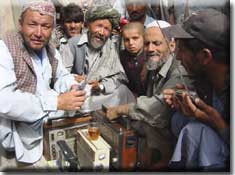Afghanistan: Prospects for Free & Independent Media
with Pakistani journalist and best-selling author Ahmed Rashid
Image on right: A group of Afghan men listen to transistor radio broadcasts on the streets of Kabul. (Photo by Dominic Medley, Internews Afghanistan country director. Photo courtesy of Internews)
 A little less than a year after the fall of the Taliban, what challenges face journalists in Afghanistan and what can the international community do to help foster the growth of a free and independent media there? On September 24 the U.S. Institute of Peace and Internews co-sponsored a special discussion on these and other issues with acclaimed Pakistani journalist and best selling author Ahmed Rashid.
A little less than a year after the fall of the Taliban, what challenges face journalists in Afghanistan and what can the international community do to help foster the growth of a free and independent media there? On September 24 the U.S. Institute of Peace and Internews co-sponsored a special discussion on these and other issues with acclaimed Pakistani journalist and best selling author Ahmed Rashid.
This presentation was webcast live and followed by questions from the floor.
Speaker
- Ahmed Rashid
Journalist and author of Jihad: The Rise of Militant Islam in Central Asia (Yale University Press, 2002)
Based in Lahore, Ahmed Rashid is the Pakistan, Afghanistan, and Central Asia correspondent for the Far Eastern Economic Review and the Daily Telegraph in London. A frequent television and radio commentator, Rashid is the author of the best selling books Jihad, The Rise of Militant Islam in Central Asia (Yale University Press, 2002) and Taliban: Islam, Oil and the New Great Game in Central Asia (Yale University Press, 2000). Since September 11, 2001, Taliban has been translated into 22 languages and has sold over three quarters of a million copies.
In February, Ahmed Rashid brought together the Open Society Institute, the AOL Time Warner Foundation and Internews Network to establish the Open Media Fund for Afghanistan, which provides grants to newly emerging Afghan media. To date, the fund has awarded over $125,000 to a diverse range of publications in Afghanistan including a children's magazine, a satirical magazine, a weekly newspaper, and a newsletter by the Loya Jirga Commission in Kabul which was published in three languages for the promotion of the Loya Jirga held in June.
Moderator
- Richard Kauzlarich
Director, Special Initiative on the Muslim World, U.S. Institute of Peace



